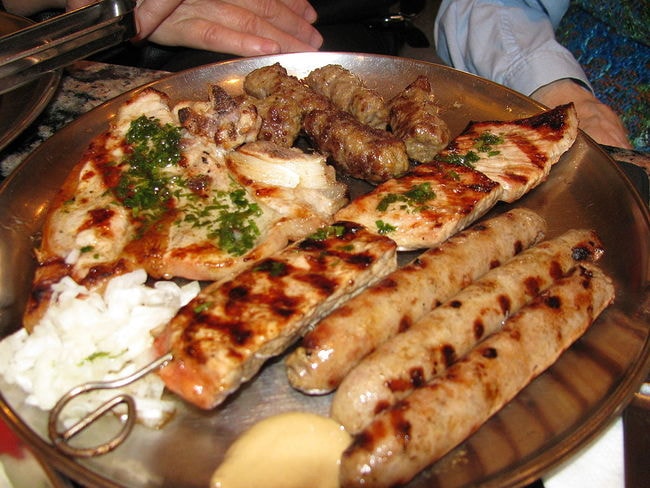Introduction: Bosnian cuisine and vegetarianism
Bosnian cuisine is a blend of Eastern and Western influences, reflecting the country’s rich history and cultural diversity. The cuisine is characterized by the use of spices, herbs, and vegetables, as well as meat, particularly beef, lamb, and pork. However, with the growing popularity of vegetarianism and veganism around the world, many are curious to know if there are any vegetarian options in Bosnian cuisine.
The importance of meat in Bosnian cuisine
Meat is an essential part of traditional Bosnian cuisine, and it is used in many dishes. Cevapi, a grilled minced meat dish, is one of the most popular Bosnian dishes and is often served with onions, sour cream, and flatbread. Other meat-based dishes include burek, a savory pastry filled with meat, and dolma, stuffed vegetables with minced meat. Meat is also used in soups, stews, and casseroles. Meat dishes are deeply ingrained in Bosnian culture, and they symbolize hospitality, wealth, and social status.
Vegetarian dishes in traditional Bosnian cuisine
Despite the heavy emphasis on meat in Bosnian cuisine, there are several vegetarian dishes that are part of the traditional cuisine. One such dish is grah, a stew made with beans, onions, peppers, and spices. Another vegetarian dish that is popular in Bosnia is sarma, which is made by stuffing grape or cabbage leaves with a mixture of rice, onions, and spices. Bosnian-style ajvar, a condiment made from roasted red peppers, eggplant, garlic, and chili peppers, is also a vegetarian option that is widely enjoyed. In addition, Bosnian cuisine features many vegetable-based side dishes and salads, such as tomato and cucumber salad, roasted vegetables, and stuffed peppers.
Adapting meat dishes for vegetarian diets
While many traditional Bosnian dishes are meat-based, it is possible to adapt them for vegetarian diets. For example, cevapi can be made with plant-based meat substitutes or with a mixture of vegetables, such as mushrooms, lentils, and zucchini. Burek can be filled with cheese or spinach instead of meat, and dolma can be made with rice or bulgur wheat instead of meat. With some creativity and experimentation, it is possible to enjoy Bosnian cuisine while following a vegetarian diet.
Contemporary vegetarian options in Bosnian cuisine
In recent years, there has been a growing interest in vegetarianism and veganism in Bosnia and Herzegovina, and as a result, many restaurants and cafes now offer vegetarian options on their menus. Some of the popular vegetarian dishes include falafel, hummus, and lentil soup. Additionally, many restaurants now offer vegetarian versions of traditional Bosnian dishes, such as vegetarian cevapi and vegetarian burek.
Vegetarian-friendly restaurants in Bosnia and Herzegovina
Vegetarian-friendly restaurants are becoming increasingly common in Bosnia and Herzegovina, particularly in the capital city of Sarajevo. Some of the popular vegetarian restaurants in Sarajevo include Barhana, which serves vegetarian and vegan Bosnian dishes, and Falafel, which offers Middle Eastern-inspired vegetarian options. Other notable vegetarian-friendly restaurants include Mak Dizdar, which serves vegetarian and vegan burgers, and Veganica, which specializes in plant-based Balkan cuisine.
Vegetarian festivals and events in Bosnia and Herzegovina
There are several vegetarian and vegan festivals and events held throughout Bosnia and Herzegovina. The Sarajevo Veggie Festival is one such event that takes place annually and features vegan and vegetarian food stalls, workshops, and talks. The festival aims to promote plant-based living and sustainability. Another popular event is the Green Fest, which is a sustainable living festival that includes food stalls, workshops, and talks on vegetarianism and veganism.
Conclusion: Exploring vegetarianism in Bosnian cuisine
While meat is a significant part of traditional Bosnian cuisine, there are several vegetarian options available, and the growing interest in plant-based living has led to an increase in vegetarian-friendly restaurants and events. With some creativity, it is possible to enjoy Bosnian cuisine while following a vegetarian or vegan diet. Exploring vegetarianism in Bosnian cuisine is a great way to appreciate the country’s rich history and cultural diversity and to promote sustainable living.

